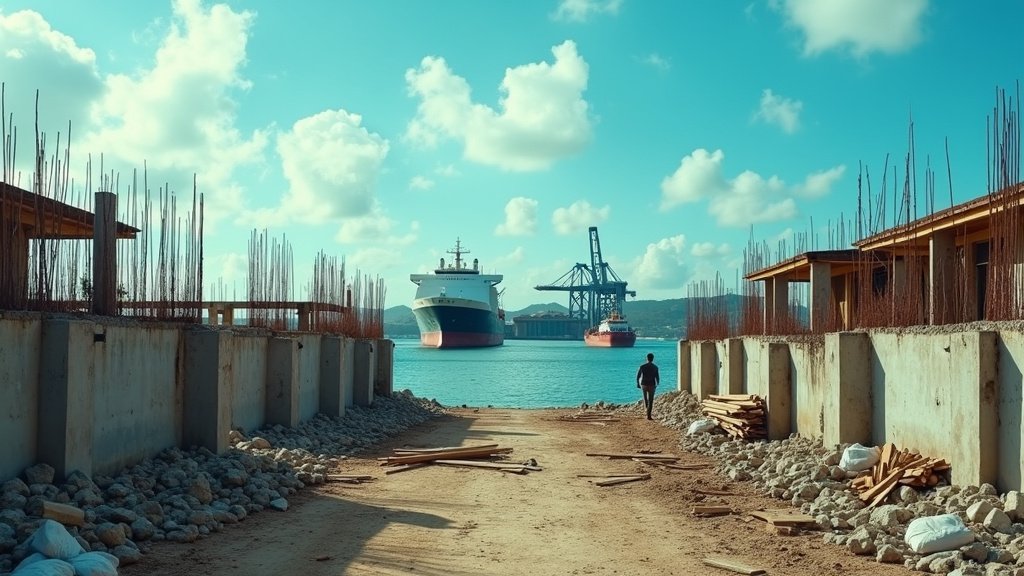In its August 16, 2025, edition, The Jamaica Magazine presented a comprehensive analysis of the island’s evolving economic landscape, highlighting significant challenges within the construction sector alongside a burgeoning surge in private investments bolstering the maritime ecosystem. The report painted a nuanced picture, revealing the ripple effects of global supply chain disruptions impacting local housing projects while simultaneously underscoring a strategic pivot towards strengthening Jamaica’s position as a regional shipping hub.
The findings from the reputable publication detailed how the relentless increase in shipping raw material prices has cast a long shadow over the nation’s construction industry. This escalation, stemming from global economic pressures and logistical bottlenecks, has created substantial difficulties for numerous homeowners across the island. The core issue lies in the fact that many pre-approved loan amounts, once deemed adequate for planned construction or renovation projects, have become woefully insufficient. This unforeseen surge in material costs has pushed building budgets far beyond initial estimates, leaving many prospective homeowners in a precarious financial bind. The dream of homeownership, a cornerstone of stability and progress for many Jamaican families, is now confronting considerable hurdles as the cost of steel, lumber, cement, and other essential building materials continues its upward trajectory. The direct consequence is either stalled projects, significantly delayed timelines, or an urgent need for homeowners to secure additional, often elusive, financing, placing an immense strain on household budgets and the broader real estate market in Jamaica.
Construction Sector Grapples with Inflated Costs
The rising cost of raw materials, largely propelled by escalating global shipping rates, has presented a formidable challenge to the vibrant construction sector in Jamaica. Developers and individual builders alike are grappling with unprecedented expenses, leading to a palpable slowdown in the pace of new constructions and renovations. This economic pressure is particularly acute for the average Jamaican homeowner, many of whom meticulously planned their projects based on fixed loan amounts. With the price of essential raw materials skyrocketing, the purchasing power of these loans has diminished considerably, forcing difficult decisions. Projects are either being scaled back, put on indefinite hold, or facing significant delays as individuals and companies scramble to bridge the funding gap. This situation not only impacts the immediate housing supply but also has broader implications for employment within the construction industry, a vital component of the nation’s economy. The Jamaica Magazine’s report underscored the urgent need for innovative solutions to mitigate the impact of these external cost pressures on domestic development and affordability, recognizing that accessible housing remains a critical social and economic imperative.
Kingston Harbour Becomes a Nexus of Maritime Investment
Contrasting the challenges in construction, the same Jamaica Magazine program brought to light a remarkably positive trend: a notable surge in private investments within the critical maritime ecosystem surrounding the iconic Kingston Harbour. This influx of capital signals a strategic strengthening of Jamaica’s port capabilities and its ambition to become an even more dominant player in regional and international shipping lanes. The investments are not merely theoretical; they are tangible and focused on specific, high-value maritime services crucial for global trade.
Key areas witnessing this robust private sector engagement include significant upgrades and expansions in tug services, essential for guiding large vessels safely in and out of the busy harbour. Enhanced tug capabilities improve port efficiency and safety, making Kingston an even more attractive destination for container ships and cargo carriers. Furthermore, there has been a considerable boost in bunkering operations, which involves the supply of fuel to ships. A reliable and competitive bunkering service is a cornerstone of any major port, attracting more vessel traffic and cementing Kingston’s role as a vital stopover point for international shipping routes. Perhaps most significantly, the report highlighted substantial private capital flowing into dry dock and vessel repair operations. This sector is critical for maintaining the global fleet, offering comprehensive services from routine maintenance to complex structural repairs. Developing world-class dry dock facilities not only creates high-skilled jobs but also establishes Kingston Harbour as a premier destination for vessel servicing in the Caribbean, attracting ships that might otherwise seek repairs much further afield. This strategic investment in maritime infrastructure and services is positioning Jamaica as a formidable force in the global logistics network, promising long-term economic benefits and diversification away from traditional sectors. This positive news underscores the resilience and adaptability of the Jamaican economy, finding new avenues for growth and international competitiveness amidst global economic shifts.
In conclusion, The Jamaica Magazine’s August 16, 2025, edition presented a dual narrative of economic adaptation. While the nation grapples with the direct impact of increased shipping raw material prices on its vital construction sector, causing undeniable hardship for homeowners, the simultaneous surge in private investments within the Kingston Harbour’s maritime services paints a promising picture of strategic growth. This burgeoning focus on tug services, bunkering, and dry dock and vessel repair operations signifies a strong commitment to leveraging Jamaica’s geographical advantage, positioning it as a pivotal hub in the global shipping industry. The ongoing developments underscore the dynamic nature of the island’s economy, navigating challenges while simultaneously seizing opportunities for future prosperity.

